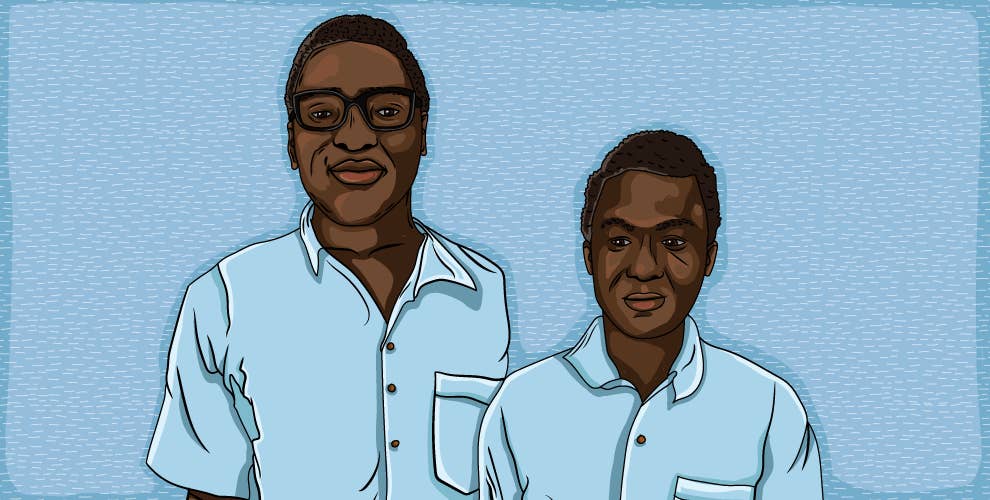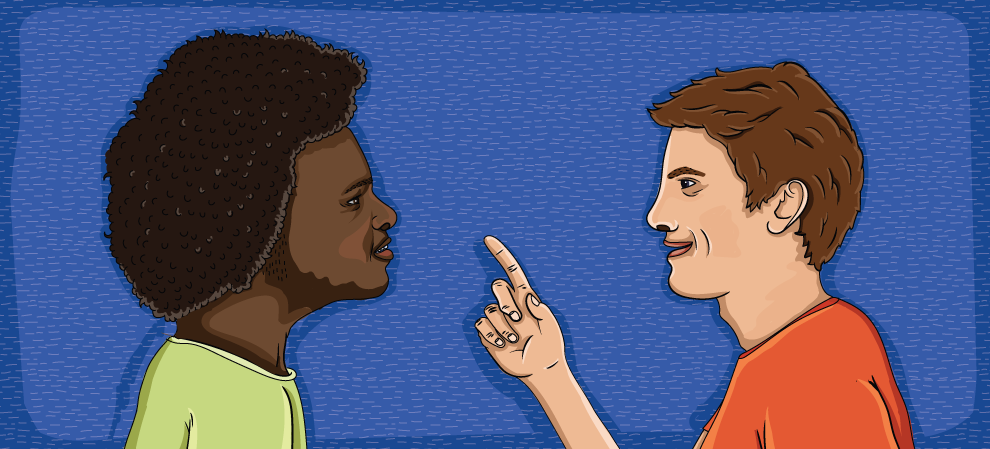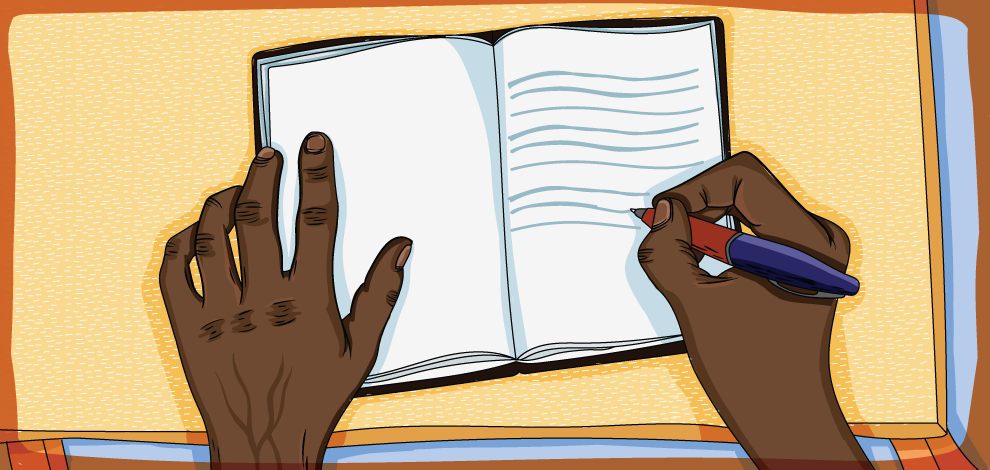
My younger brother was heading to university, making him only the second man in our family to have a go at higher education in the UK. I thought he might need some advice. Our dad’s rambling monologues based on his 1980s degree in Ghana just wouldn’t cut it, while Mum’s “be nice to people and they’ll be nice to you” perspective has the side effect of leading to situations where people can easily take advantage. Having long wished someone had given me a guide on “how to be” in the wider world, I felt it fell to me to make sure he didn’t lack.
So I went out and bought a A6 Moleskine and filled with it with scribblings. What started as a small project about life as a grown-up at university (“Vodka makes the men in our family punchy”; “never buy a printer for your room, because everyone will use it”) soon morphed into a much larger thing: trying to explain the weird waters my brother would have to navigate as a young black man. That Moleskine became a resource on the types of microaggressions he could expect to be on the receiving end of, something he could refer to when he felt angry and depressed.
Here’s some of the knowledge I passed to my 18-year-old brother, collected in a black leather notebook and handed over in the back of a minicab on a rainy Saturday in Leicestershire.

Trying to learn about the type of person you want to be in an environment that is still so badly lacking in understanding of who you are and how you function will be frustrating. Your lecturer will nearly always be white, and a culturally biased curriculum won't help either: Black and minority ethnic (BME) students have a 1 in 20 chance of graduating with a first, compared with the 1 in 4 chance our white counterparts have. The same year you started uni, another 29,994 black students also had their UCAS applications accepted, and a good number of you will be confronted by an ecosystem that still hasn’t figured out how to cater to your needs. In 2010 I sat in a seminar room in Somerset staring incredulously at a lecturer who couldn’t quite get their head around the concept of a wannabe screenwriter from east London not having in-depth knowledge of the theatre scene. I eventually caught up with Beckett, but it wasn't smooth.
Going to university in the UK as a minority student can be jarring, and a lot of your early days there will be spent looking around for the few people out there that "get it". I introduced myself to my best friend at uni by literally walking up to him in the student union and saying, “I’m black, you’re black. They don’t appear to be many of us here. Do you want to be friends?”
At times I felt let down, lied to, and angry at teachers, peers, and co-workers for not getting it. Like other BME students who struggle with relocation, I longed for a tutorial to navigate the culture clash that occurred when I left the big city for a not-so-large town. One day, someone is going to make a website listing all the black barbershops in the country and they are going to make a killing. That person could be you. Be ready.

Sometimes you will feel like a foreign emissary fielding questions about your hair, your food, and the words you use. It takes time, and I spent a lot of my teens feeling like an alien. But by my early twenties I felt like a time traveller who kept getting flung two or three years backwards, as mainstream pop culture picked up, played with, and then eventually discarded elements of my culture before moving on to the next trend (and messing up the citation). Twerking didn’t start with Miley, fuckboi doesn’t mean jerk, yaaass didn’t start with Gaga. It can be fun and exciting introducing friends to grime and black American stand-ups. It can be exasperating trying to get a point across to someone who doesn’t understand what’s going on when I use the term “bare tonk” to mean something that’s large and potentially cumbersome.

I remember once standing in a nightclub about three months into university and have a confused classmate ask me what I was doing there. “You know they play indie here, right?”
Limited representation of your culture in film and television means people can find it confusing when they first discover you don't fit the stereotypes they expect – I got used to throwing people’s internal circuitry for a loop thanks to my less than stellar dance moves. This works in the other direction too, mind. Having been surrounded by a very particular type of Catholic grammar school student, it took me longer than I’m proud to admit to work my way out of archaic preconceptions that were offensive to my female and LGBT friends.


A young, streetwise black teen trying to figure out life, love, and how the world works in a new city? A lot of people are going to take you to be like Will out of The Fresh Prince of Bel-Air. Or, depending on your fondness for Barry Manilow, Carlton.
For the most part you’ll be OK with it: The Fresh Prince was a funny television show with a well-written black cast. It Trojan Horsed a lot of issues black people face that white people might not know about into the mainstream, so there are plenty of worse TV shows my white peers could use as a cultural guide. I got a lot of mileage out of aping Will’s happy-go-lucky, smart-mouth style on campus.
The problem was, unlike in The Fresh Prince, if at university if I ended up angry at the world, or frustrated at roadblocks – both personal and academic – a cool deus ex machina wouldn’t arrive to help me solve my problem in 22 minutes. Will’s show made for an easy template for life, but the schtick was hard to buck: Once a sassy hero, always a sassy hero. And there's a scarcity of Uncle Phils – a generation wept when James Avery died. We all could do with a real-life mentor like him.

Back in your awkward late-teenage phase, you twigged that having a massive afro is probably one of the greatest icebreakers out there. Comb your hair, wait for someone to comment, introduce yourself. I did the same thing when I was about the same age and we both ran into the same problems: Some people would comment on its coolness, others would run their hand through it and compare it to a jumper.
Nearly every single person who went for my hair did it because they found it interesting. Some crossed the line. When it comes to talking to someone who's unknowingly done so, it can be a lot easier to educate them on why they're wrong than to shout at them. But here's a quirk of privilege: It puts the onus of an apology on you, even though you are not the transgressor. You’ll be accused of playing the race card, and told to "calm down". The annoying thing with this quirk is that the more you angrily protest that what they’ve done is wrong, the less they listen. Try not to raise your voice. Try not to speed up your speech. Don’t play their game. Play yours and show them how and why they’ve fucked up.

Every now and again someone will turn up to a fancy dress party at a university in blackface.
Every now and again someone will look to get an edgy thrill out of calling you a nigger.
Every now and again someone is going to see you as nothing more than the colour of your skin.
Every now and again you are going to have to CLAP THE FUCK BACK.


I get scared about being angry. I get scared about something displeasing me, me raising my voice at someone and getting tarred with the “angry black guy” brush. It means I spent a lot of time at university keeping things mellow when it was within my rights to get vocally angry. As I’ve got older, I’ve got better on when to stand firm and when to tilt; better at when I need a scalpel or sledgehammer.
You may have to bite your tongue for the greater good, but try not to worry about keeping quiet for fear of being taken as a spokesperson for all black people. Now I know that anyone who thinks that way isn't worth your time in the first place.

Three years ago, I sat across from a different screenwriting tutor, telling her my frustrations about trying to write things to fit into a world not built for someone who looks like me or has my background. I told her how I’ve always felt like the outsider looking in, being one of the only black people in my sixth form, in my job, in my sports team, and how that made me angry, how sometimes that makes me pissy and sulky, full of despair. I told her all of that. Then she said in the most throwaway, I’ve-figured-it-all-out voice: “Maybe, if you’ve been through all this and always had a problem, maybe the problem is you?”
Not cultural bias, nor a wilful ignorance or lack of interest in understanding how I was different. No. Maybe the problem was me for having the temerity to exist in these spaces in the first place.
So, you know, your mileage may vary.

It’s terrible that I had to write a book explaining how the world sees you differently based on how you look. It’s terrible that most of my advice is more in line of “bad things will happen to you and you have to learn how to deal with that” rather than uplifting messages of how university may well be the making of you.
I’m not proud of the fact that I react to reports of institutional racism with a noisy exhalation and a shrug rather than angry shock and indignation, and I sincerely hope you do not take my words of advice as a sign of appeasement or apathy.
When I was 8 (you were 3, so the chat would've been useless to you), mum sat me down and explained to me what racism was. It was around the time of the Stephen Lawrence inquest. I remember telling her how stupid and unfair it was that some people might not like me for the way I look. It's one of the worst conversations I’ve ever had, but one she viewed as her responsibility to have with me, to keep me safe. I gain deeper appreciation for it as I grow older.

During one adolescent slanging match with Dad about me following in his footsteps, he broke down and revealed his motivations for pressing me so hard. He told me his accent and “wild African teeth” meant that he had gone "as far as he could"; he’d reached his glass ceiling. The simple fact that I had an estuary London accent meant that I might be able to squeeze a couple years more out of a career before I hit mine.
To see your life as a link in a series of small gains is weird, but that's how Dad sees it. He came to the UK so his children could be British citizens and have the benefits that come with that. I wrote this book for you so you might understand what it’s like being Patient Zero in a white-dominated academic space. I’ll probably write you another when you graduate and move into the workforce. I hope that in turn, you'll grow ever more aware of your responsibilities. You're already en route: I remember you were assigned to tutor younger black students at school.
It’s slow and often unsteady and will take time. These small changes that pass on from parent to child, from sibling to sibling, from teacher to student, and boss to employee are going to help all of us one day. If my accent has given me a couple more years in the tank then maybe you'll get a couple more.
I believe things are getting better. Slowly.
